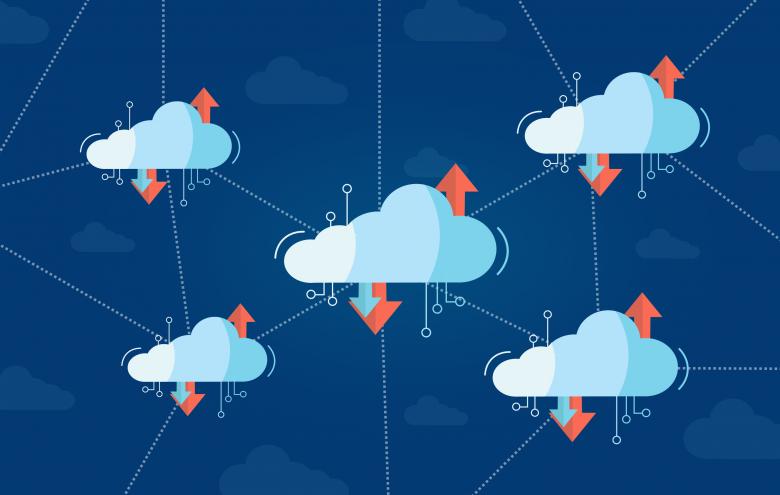
(Source)
What are APIs and Why Do They Matter?
An Application Programming Interface, or API, is a shared language and protocol that allows different software platforms to connect to each other. For example, Reddit offers an API that allows programmers to create bots that post on the platform or to automate moderation actions. Another common example is the PayPal API, which allows web stores to process payments via PayPal.
The Public Interest Stakes of API Access
APIs foster competition and innovation by enabling interoperability between web services controlled by different companies. By facilitating data sharing across firms and sectors, APIs lower the barriers to entry for competitors and complementary services. APIs also reduce the likelihood of platform lock-in: in 2018, Microsoft, Google, Twitter, and Facebook announced the Data Transfer Project, an API-driven initiative to make it easier for users to move their data between those services, a clear example of enabling more user choice.
APIs hold importance for public policy beyond fostering competition. Public discourse increasingly happens on private platforms. API access makes it possible for journalists, researchers, watchdog groups, and civil-society organizations to study misinformation, political messaging, harassment, and platform power. APIs are important to disabled people, who often need specialized tools to interact with online platforms—tools that cannot work without APIs. APIs also enable middleware, third-party tools that give users more control over the content they see online and present a viable alternative to heavy-handed laws that may infringe on important free speech rights.
Revisiting Refusal to Deal Doctrine for the Platform Era
When X (formerly Twitter) ended its free API access in early 2023, it destroyed a vibrant ecosystem of third-party clients, research tools, and bots. Many saw the move as a shortsighted business decision, but it was even more significant. X’s API shutdown could be seen as a test case for the viability of foundational antitrust principles in the digital age. By cutting off its partners, X engaged in a classic “refusal to deal,” a type of exclusionary conduct that can violate § 2 of the Sherman Act.
While such claims are notoriously difficult to win in court, the rise of online platforms necessitate a re-evaluation of the doctrine’s most challenging element. In the landmark case Aspen Skiing Co. v. Aspen Highlands Skiing Corp., the Supreme Court found a monopolist liable for terminating a profitable joint venture with a rival. In Aspen, the court held that the key was the monopolist’s willingness to “sacrifice short-run benefits and consumer goodwill,” which revealed that its only conceivable motive was to harm competition.
On its face, this standard seems to doom any challenge to an API shutdown. How can a platform “sacrifice profits” by ending a free service? A narrow, cash-based definition of “profit” is a strong defense for the monopolist. It is also an economically naïve interpretation that ignores the fundamental realities of how network platforms build and maintain their market power. To properly apply Aspen Skiing to the digital world, courts must adopt a more sophisticated understanding of what a platform sacrifices when it pulls up the drawbridge.
The benefits platforms derive from open APIs are not line-items on a balance sheet, but tangible, economically vital assets. First and foremost is the benefit of user acquisition, retention, and engagement. The API allowed the Twitter platform to connect with Facebook, Myspace, Apple, WordPress, and others—places where users were already engaging online. The API also enabled Twitter desktop apps and integration with existing web dashboards that many users visited daily, helping cement the platform as an integral part of web media consumption. Third-party apps also functioned as a free R&D lab, pioneering features like “pull-to-refresh” that Twitter itself later adopted. Similarly, the thousands of useful bots providing everything from breaking news to live earthquake updates to mental health reminders made the platform an indispensable utility for many, increasing its “stickiness” and the time users spent on the service. All this directly translates to economic value through ad impressions and data collection.
By terminating its free API, a platform sacrifices all these benefits. It risks alienating its most valuable users, chokes off a stream of free innovation, and makes its own product objectively less useful. This is a direct sacrifice of short-term business advantages and, as Aspen Skiing noted, an immense amount of “consumer goodwill.” This willingness to harm one’s own product ecosystem for exclusionary ends has clear precedent. In United States v. Microsoft Corp., the D.C. Circuit looked past simple revenue and focused on Microsoft’s strategic decision to degrade its business relationships to crush a competitor. The court recognized that the real sacrifice was the monopolist’s choice to damage its own ecosystem in the short term to secure its monopoly in the long term.
Such a decision becomes economically rational only when viewed as a move to eliminate competition in an adjacent market. While third-party apps were not rivals to the social network itself, they were fierce competitors in the market for the premium user experience. Coinciding with the API shutdown, X began aggressively pushing its own subscription service, Twitter Blue (now known as X Premium), which offered many of the same features that third-party clients had long provided.
Twitter’s decision to end free API access was not a mere price change, it was a constructive refusal to deal. By shifting from a free API to a prohibitively expensive one with reported costs of over $40,000 per month, the platform made a sham offer that was functionally identical to a complete termination for independent developers. This pricing was not designed to create a new revenue stream, but to clear the field of rivals, ensuring that the only way to get a premium experience was to pay the monopolist directly.
The path for such a claim is fraught. The Supreme Court significantly narrowed the Aspen doctrine in Verizon Communications Inc v. Trinko, establishing that a monopolist generally has no duty to aid its competitors. This principle was recently applied in New York v. Meta Platforms, Inc., where the a District Court found that Facebook’s general, prospective policy of refusing API access to competitors did not, on its own, violate the Sherman Act. However, the court drew a critical distinction that is key to the present case. It explicitly noted that while a general policy may be lawful, “specific instances in which Facebook revoked a competitor’s API permissions (after previously providing it access) might have violated Section 2.” This is the crucial carve-out for the Aspen Skiing fact pattern: the termination of a prior, voluntary course of dealing (the court in New York v. Meta, however, never reached a decision on those merits, holding instead that laches doctrine precluded injunctive relief).
X’s API shutdown fits perfectly into this Aspen-style claim. It was not the enforcement of a general, pre-existing policy, but the sudden termination of a decade-long, mutually beneficial relationship with a specific class of competitors. As legal scholars have noted, the “refusal to deal” doctrine remains a vital tool to prevent monopolists from using their control over critical inputs to unlawfully eliminate competition. A timely challenge to X’s conduct would force courts to address the merits of this core theory—whether sacrificing the immense goodwill and innovation of an entire developer ecosystem could be an illegal anticompetitive act.
Suggested Citation: Kelly Ellis, Pulling Up the Drawbridge: Antitrust Liability for Platform API Shutdowns, Cornell J.L. & Pub. Pol’y, The Issue Spotter, (Nov. 19, 2025), https://publications.lawschool.cornell.edu/jlpp/2025/11/19/pulling-up-the-drawbridge-antitrust-liability-for-platform-api-shutdowns/.
About the Author


